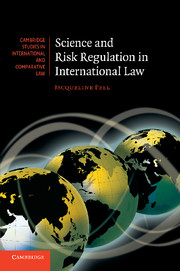Book contents
- Frontmatter
- Contents
- Preface
- Acknowledgements
- 1 Introduction: science and risk regulation in international law
- 2 Global risk governance and its legitimacy
- 3 Scientific rationality and risk in international law
- 4 Competing risk regulatory paradigms: sound science and the precautionary principle
- 5 Science and WTO regulation of SPS risk
- 6 Case studies of science and risk regulation in international law
- 7 Democratising global risk governance
- 8 What role for science in international risk regulation?
- Index
- CAMBRIDGE STUDIES IN INTERNATIONAL AND COMPARATIVE LAW
- References
6 - Case studies of science and risk regulation in international law
Published online by Cambridge University Press: 10 January 2011
- Frontmatter
- Contents
- Preface
- Acknowledgements
- 1 Introduction: science and risk regulation in international law
- 2 Global risk governance and its legitimacy
- 3 Scientific rationality and risk in international law
- 4 Competing risk regulatory paradigms: sound science and the precautionary principle
- 5 Science and WTO regulation of SPS risk
- 6 Case studies of science and risk regulation in international law
- 7 Democratising global risk governance
- 8 What role for science in international risk regulation?
- Index
- CAMBRIDGE STUDIES IN INTERNATIONAL AND COMPARATIVE LAW
- References
Summary
Introduction
In recent years the interface between science and international risk governance has become an important topic of policy debate and scholarly analysis. This reflects the growing role of international requirements and global bodies in governing risk decision-making, displacing the once pre-eminent place of national authorities in this field. The lion's share of academic discussion concerning science and international risk regulation has taken place in respect of the SPS Agreement, addressed in the previous chapter. However, there are a number of other areas of international law where the role of science and expertise in risk regulation and ensuring environmental safety poses ongoing, complex issues. Beyond the sphere of the SPS Agreement, the social scientific literature has been far in advance of the legal scholarship in examining these questions. This literature has yielded many important insights, particularly concerning science–policy configurations in which scientific evidence and expertise can play their most effective role.
Despite this, there remains a pressing need for legal analysis in the area. Such analysis can add to wider understanding of the role of science in international risk regulation by providing an evaluation of the contribution of specific laws (such as treaty texts) and legal institutions (such as the interpretative work of the dispute settlement system of the WTO). Indeed, as the SPS jurisprudence discussed in the previous chapter illustrates, law may well represent a privileged and central venue for the constitution of regimes of knowledge.
- Type
- Chapter
- Information
- Science and Risk Regulation in International Law , pp. 264 - 336Publisher: Cambridge University PressPrint publication year: 2010



